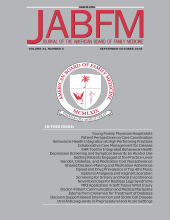Abstract
Background: Physician denial of patient requests is associated with lower patient satisfaction. Our objective was to explore factors that influence physician request denial and patient satisfaction after request denial.
Methods: Cross-sectional observational study of 1141 adult patients seen during 1319 outpatient visits with 56 primary care physicians. We measured patients' postvisit self-report of requests and request fulfillment, visit satisfaction, sociodemographics, health status, symptom burden, life satisfaction, medical skepticism, and whether patients saw their usual physician and a faculty or resident physician. We used mixed-effects regression analyses to identify predictors of request denial and visit satisfaction among patients who had a request denied.
Results: Patients made at least 1 request at 867 visits (65.7%) with at least 1 denied request reported at 182 visits (21.0%). Patients who saw their usual physician were less likely to report a request denial (adjusted Odds Ratio [aOR], 0.61; 95% CI, 0.42 to 0.88), and patients with the highest symptom burden (aOR, 2.21; 95% CI, 1.38 to 3.55) or greater medical skepticism (aOR, 1.35; 95% CI, 1.03 to 1.78) were more likely to report request denials. After request denials, patients seeing their usual physicians reported significantly greater visit satisfaction compared with not seeing their usual physician (adjusted percentile rank in visit satisfaction: 12.4%; 95% CI, 3.5% to 21.2%).
Conclusions: Approximately one fifth of visits in primary care have a denied request. Having an office visit with one's usual physician is associated with reduced likelihood of request denial and may mitigate the adverse impacts of request denial on patient visit satisfaction.







